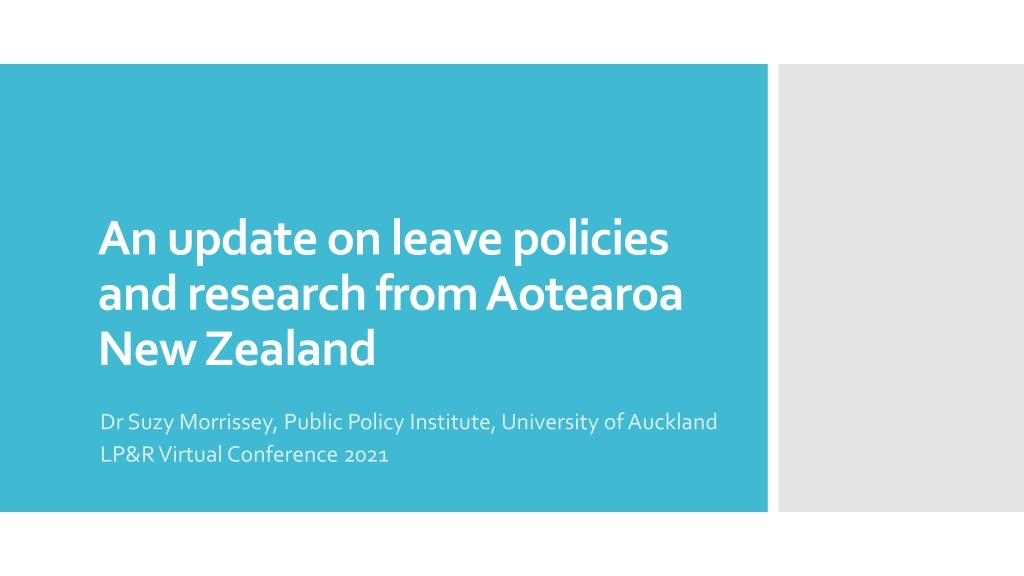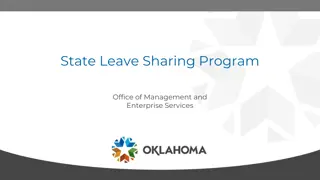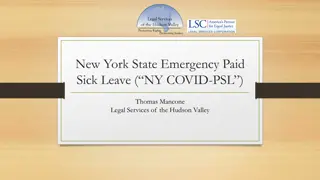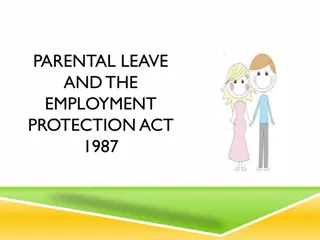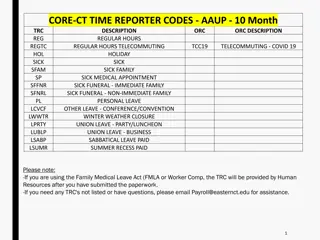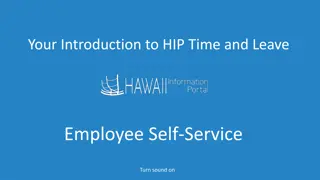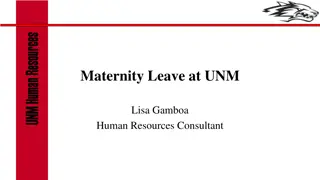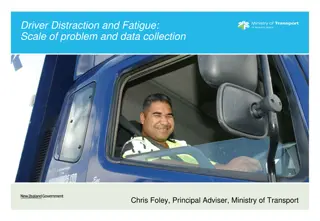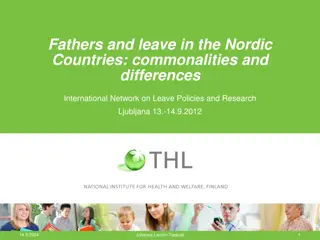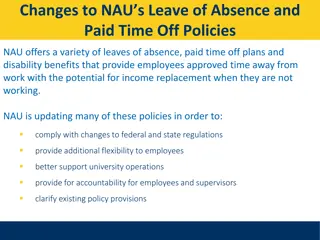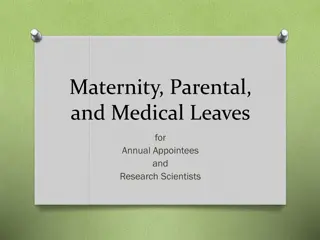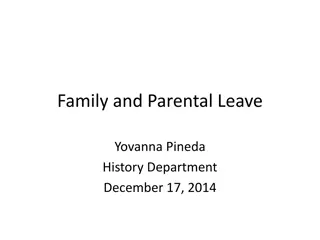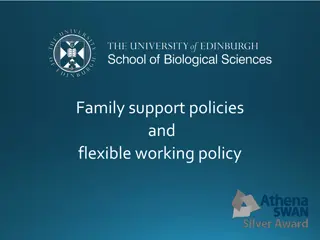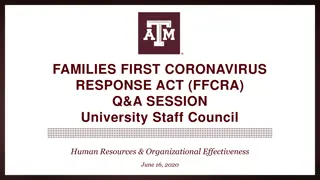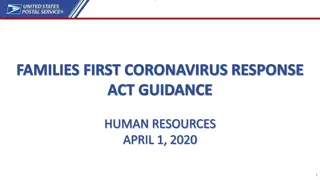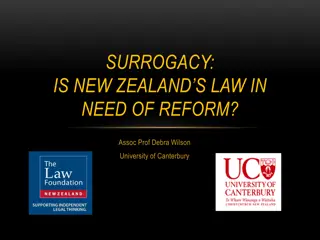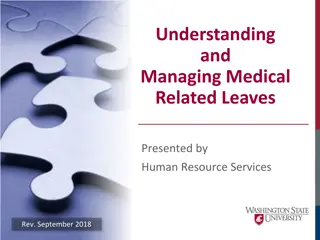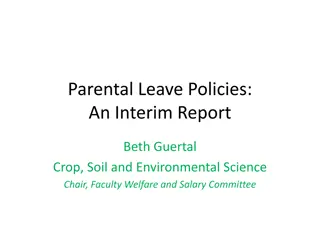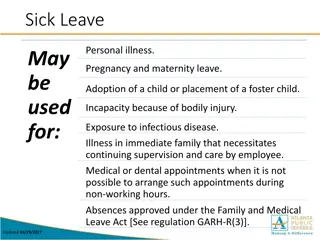Update on Leave Policies and COVID-19 Measures in New Zealand
Dr. Suzy Morrissey from the University of Auckland discusses the leave policies in Aotearoa New Zealand, including 26 weeks of parental leave for the primary carer, temporary return-to-work changes, COVID-19 alert levels, wage subsidies, and special leave provisions for bereavement and family violence situations.
Uploaded on Oct 07, 2024 | 0 Views
Download Presentation

Please find below an Image/Link to download the presentation.
The content on the website is provided AS IS for your information and personal use only. It may not be sold, licensed, or shared on other websites without obtaining consent from the author. Download presentation by click this link. If you encounter any issues during the download, it is possible that the publisher has removed the file from their server.
E N D
Presentation Transcript
An update on leave policies and research from Aotearoa New Zealand Dr Suzy Morrissey, Public Policy Institute, University of Auckland LP&R Virtual Conference 2021
26 weeks shareable parental leave for primary carer (no dedicated paid maternity or paternity leave) Must be taken as one period of leave Paid at wage replacement to low cap currently NZD$606.46 / approx. 355.55 (below full-time minimum wage) Includes same-sex couples and non-parental primary carer Leave and payment can be separate PPL overview
Temporary change made to allow return to work without losing remaining leave entitlement One temporary return to work only Not considered to be on parental leave at that time, parental leave is paused Still only one transfer of leave, so cannot switch between parents/carers Parental leave and COVID-19
NZ has four Alert Levels (4 is complete lockdown and 1 is unrestricted domestically but with a closed border) NZ has spent time at all four Alert Levels over the last year Due to a small Delta outbreak, Auckland is currently at Alert Level 4, and the rest of the country is at Alert Level 2 Current COVID-19 status
Wage Subsidies have been paid to businesses with reduced revenue (to keep paying staff their wages) Leave Support has been paid to businesses if they have workers who need to self-isolate and cannot work from home Other COVID-19 information
Three days paid bereavement leave if an employee or their partner experiences a miscarriage or stillbirth Proof of pregnancy, miscarriage or stillbirth is not required Does not apply to terminations Other leave updates bereavement leave
10 days of paid family violence leave (employers can give more than the 10 days required by law) Can be taken to support a child who has experienced family violence (if they live with you) Paid at ordinary time (like annual/sick leave) Short-term flexible working arrangements for up to 2 months Right not be treated adversely in the workplace because they might have experienced family violence Other leave updates family violence leave
Two pieces of new research using the Growing Up in New Zealand (GUiNZ) longitudinal survey data GUiNZfollows more than 6,000 Kiwi children born in 2009-10 https://www.growingup.co.nz/study-history Separate considerations of mothers and fathers leave use Research update
Economic research institute based in Wellington Research update Team: Shakked Noy & Isabelle Sin Drivers of Mothers Parental Leave Decisions https://www.growingup.co.nz/sites/grow ingup.co.nz/files/documents/MWk%20Fi nal%20research%20report_May2021.pdf
The mothers preferred an average of 69 weeks of leave, anticipated 36 weeks, and actually took 53 weeks. Current parental leave policies may not be flexible enough to cater to self-employed mothers, who tend to return very quickly to work, partly to keep their businesses afloat. Lack of access to affordable childcare and to sufficiently flexible jobs contribute to mothers taking years off work. Research update Drivers of Mothers Parental Leave Decisions
Recommendations: Improve and strengthen messaging to women going on parental leave about their employment rights. Provide information to employers about flexible working practices and how these can improve employee retention and enable them benefit more from their investment in employees. Consider increasing flexibility in how parents can take PPL to better accommodate self-employed parents need to maintain their business. Consider improving supports for mothers employment (e.g., access to childcare, incentivising fathers to take parental leave, improving accessibility of flexible working arrangements and job sharing). Improve careers guidance, taking into account the experience of parenthood on labour market choices specifically for mothers (or others considering becoming parents) who seek to return to the labour market or change careers following the birth of their child. Research update Drivers of Mothers Parental Leave Decisions
Auckland University of Technology Research update Team: Juliane Hennecke, Gail Pacheco, Lisa Meehan, Alexandra Turcu. Fathers' Household and Childcare Involvement Timeframe: April 2021 - March 2022
The project explores the involvement of New Zealand fathers in their children's upbringing and other domestic duties by looking at: fathers' time investment from quantitative and qualitative perspectives the external and internal determinants of paternal time investment the consequences of different levels of parental involvement for children s later cognitive and non-cognitive outcomes. Research update Fathers' Household and Childcare Involvement
I am a specialist advisor to the AUT projects on fathers Disclaimer
